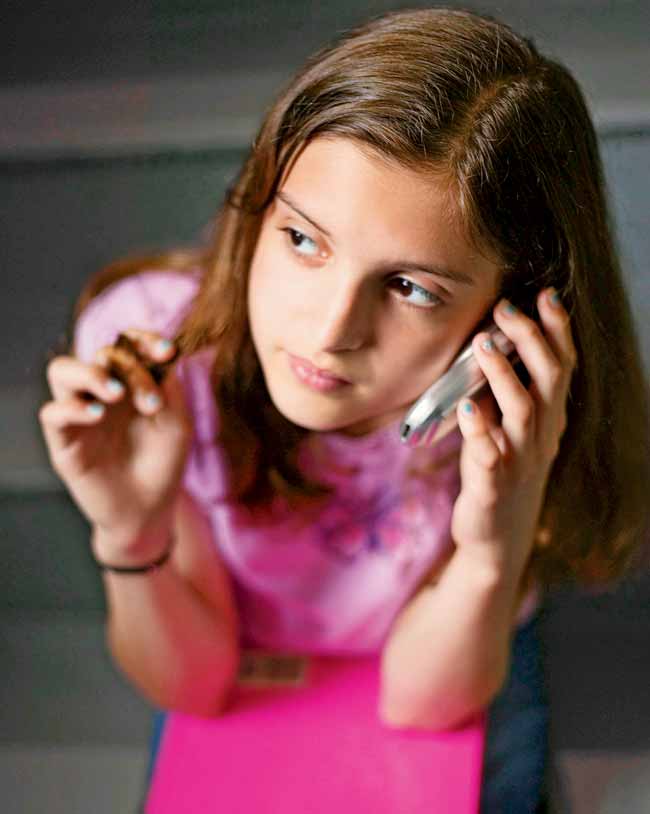It's wonderful how so much of technology has managed to fit into today's gadgets. Mobile phones, tablets, watches all aim to make our lives simpler and smarter. But behind the smartness lurks the hidden danger of electromagnetic radiation that can affect your child’s growth in more ways than you can imagine. Hassan M Kamal investigates

SAR
In this age of WhatsApp, Facebook and Twitter, and the need to stay connected 24x7, it's impossible to imagine our lives without a mobile phone. But as it turns out, it's not just adults, who are spending time glued to their smart devices but toddlers even, who may or may not have taken their first steps.

ADVERTISEMENT
A new study, conducted by a marketing research firm, says that kids between 0-5 years are using mobile apps for a whopping 18-20 hours weekly. The study, questioned 2,000 parents, mostly from middle and higher income groups, about their gadget usage behaviour and that of their children. The findings revealed that of all participants, 88% said that they let their kids use their smart devices whereas 12% said their kids had their own. It also stated that by the age of 8, 97% of children have used a mobile phone, tablet or a similar device.

More startling is the usage of apps. Ambika Sharma, MD, Pulp Strategy Communications, which conducted the survey, says that the usage of app among very young children is growing rapidly — at times, for learning but mostly for entertainment. The study found that gaming apps had 77% adoption versus 23% for learning apps. She elaborates, "Kids, today, are hooked to smart devices. They are learning to master mobile phones and tablets, well before they read. Parents allow their kids to use smart devices to stay busy."
The study also had parents saying that they allow their kids to use smart devices, because it would help in their development and growth. However, a recent study, conducted by Boston University School of Medicine gives a different view. The study says that children younger than 30 months "cannot learn from television and videos as they do from real-life interactions." To use a mobile device before that age on tasks that aren't educational can be "detrimental to the social-emotional development of the child."
The American Academy of Pediatrics (AAP) recommends that children under the ago of 2 must not spend any time in front of media screens, including phones, tablets and television. "A child's brain develops rapidly during these first years, and young children learn best by interacting with people, not screens," writes AAP.
However, Dr Pavan Sonar, consulting psychiatrist, says that certain smartphone apps related to identification of colours and objects can be helpful to young children. "Through their use, kids can develop their visual memory," he adds. But he also warns against prolonged use of these apps. "This can lead to lethargy and obesity. It takes them away from playing in the outdoors, and thus, is harmful for their social development and restricts motor skill coordination." He also warns against children developing addiction to gadgets as young as 7 years, which may lead to other negative effects like: chances of ear infections, attention problems, deterioration in academic performances, sleep disturbances and mood swings, among others.
Smart devices and radiation
Another possible danger to excess usage of these smart devices, says Dr Meghal Sanghavi, onco surgeon, Wockhardt Hospital, is exposure to electromagnetic field radiation or Radio Frequency (RF) energy emitting out of smart devices.
"Smartphones, tablets, e-book readers, watches, emit RF energy, which can damage the body over a long period of exposure. The effects to radiation exposure are not immediate instantaneous, but there is evidence to suggest that in the long term, it can cause damage to kids," she adds.
Unsafe for kids?
The radiation from a mobile phone is considered unsafe across age groups. However, children are at greater risk, stated a 2009 scientific paper, presented by Dr Om Gandhi, a professor of Electrical Engineering at the University of Utah. "The heads of children are in the stronger magnetic field regions resulting in higher induced currents for the brain as compared to adults," the study pointed out.
But aren't the SAR values in mobile phones already within the safe limits? Not really. Dr Gandhi, in the study, also stated that the mannequin models chosen by the industry for SAR compliance testing results, "gives an SAR that is up to two or more times smaller than for the anatomic models of the adult head, and an even larger underestimation of the SAR for the heads of kids." This means that SAR values listed on phones are likely to be incorrect.
Pranav Poddar, director, Synergy Environics, a company that provides anti-radiation solutions says that the SAR norms are only for thermal effect of radiation. "It is well established that non-thermal effects of radiation are more harmful. Sadly, there are no norms specified on this front," he says.
The solution
Poddar says the major problem is the extent of usage. "Some device manuals (like iPhone) recommend a talk time of maximum six minutes per hour, and also recommend that the device should be kept a minimum of 15-25 mm away from the body at all times. However, we are not aware of these warnings as we don't read manuals and therefore, we do not follow these instructions," he adds. Sharma, however, says that, "at the end of it all, the onus lies with parents to monitor things."
 Subscribe today by clicking the link and stay updated with the latest news!" Click here!
Subscribe today by clicking the link and stay updated with the latest news!" Click here!







